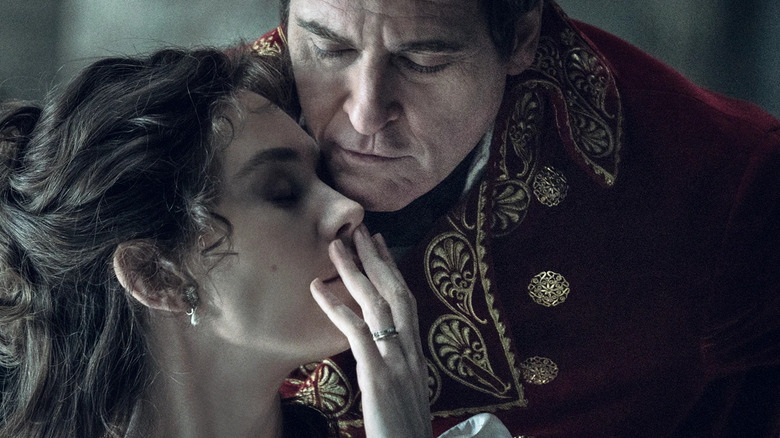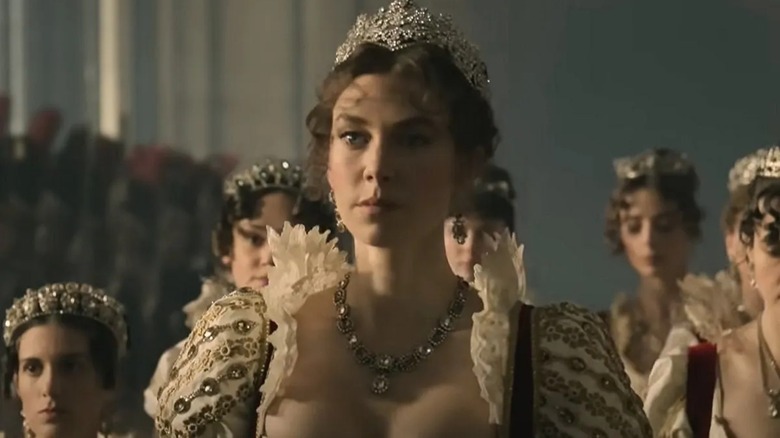Did Josephine Actually Love Napoleon? Ridley Scott Has Thoughts
In Ridley Scott's new historical biopic "Napoleon," the relationship between Napoleon Bonaparte (Joaquin Phoenix) and Joséphine de Beauharnais (Vanessa Kirby) is depicted as refreshingly direct and even blissfully adolescent, the only casual thing for both people in a whirling miasma of military campaigns and political revolutions. They first met at a party and were instantly drawn to each other, an attraction that led to a few arranged meetings, followed by direct sexual overtures. By Scott's estimation, Napoleon and Joséphine were into each other, with the former frequently pawing at the latter like a horny teenager. In a comedic twist, Napoleon is depicted as being tremendously bad at sex.
Just like in real life, Napoleon and Joséphine cheated on each other incessantly, would admit a little bit of outrage upon the discovery, and then always come back to each other. Also just like in real life, the two would write letters to each other constantly, and it's likely you had to read some of their letters in your Napoleonic History class your freshman year of college. Also just like in real life, Scott depicted Napoleon insisting that their marriage be annulled when Joséphine didn't give birth to an heir. Even after their annulment, however, Joséphine was given a mansion to live in, Napoleon visited occasionally, and they still were ... in love?
When it comes to Napoleon's and Joséphine's actual love for one another, Ridley Scott has a few theories. According to a recent interview with Deadline, Scott laid out who he saw the historically famous love affair, and how their emotions came to ebb, flow, and their incessant affairs.
It's Napoleon complex
In the opening scenes, Scott seems to base the romantic relationship on lust more than love. In a notable scene, Joséphine flashes Napoleon in a drawing room. By Scott's estimation, the two didn't really realize they were in love until political turmoil forced them apart. But not in a way that really separated them. Scott said:
"I think she was always becoming an influence on him, I think. Did she love him initially? I don't think so. By the time they came to the idea, you cannot give me a successor, I have to divorce you ... that was kind of tragic. She thinks she's going to be cast out and she's not. She walks away with an estate, two million francs, and I'll visit you went I can. She could not see other men. She did anyway."
It seems that the two loved each other, but also were tolerant of their respective romantic and sexual desires outside of their relationship. After a while, by Scott's estimation, they didn't take the infidelity too personally. It was a romance, but a pragmatic, kind of open romance. Scott continued:
"[T]hat's why I had the young Russian prince go in and say, 'You cannot hide yourself away just because he's no longer with you.' The Russian prince was a young, handsome guy who actually was later called the Wolf of Siberia. He evolved as being really ruthless and really brutal. Napoleon knew about them, but I can't believe it would be that personal to the point where he needed to take Russia because the prince may have been bonking his wife."
The Russian attacks were based on military hubris, of course. Not sexual jealousy.
Taking the heir out of the room
Scott saw the relationship between Napoleon and Joséphine as one that was constructed to be beneficial to her. Napoleon is depicted as an immature baby in "Napoleon," a man who, at least with Joséphine, was impulsive and whiny. He might have been deeply in love with her, but she was at least slightly aloof, in control, and careful to arrange — but not in a conniving way — the best scenario for herself. It was Joséphine's relationship to control. Scott said:
"I'm not sure she was that invested in him more than he was invested in her, and that she saw it as a way of her living off his newfound wealth. How long could that last? It could lasted for as long as she was entertaining, put it that way. Was she good in the bedroom? Of course. Would he have ever experienced anything like that? Not at all. She was a very smart woman. I think she was particularly beautiful, but very imposing, physically imposing and powerful."
Scott also noted a detail that wasn't included in the film: the reason Joséphine was unable to produce an heir was because of numerous abortions she had earlier in life. In the late 18th century, sulfur and arsenic were used for the procedure, and that damaged Joséphine's ability to have children.
But, were they in love? Scott's final word:
"I think by the time he had become an emperor and she therefore was empress, she had to have adjusted in terms of at least admiration. Is that next to fondness? Is that next to the possibility of love? I think it got to possibility of love."


